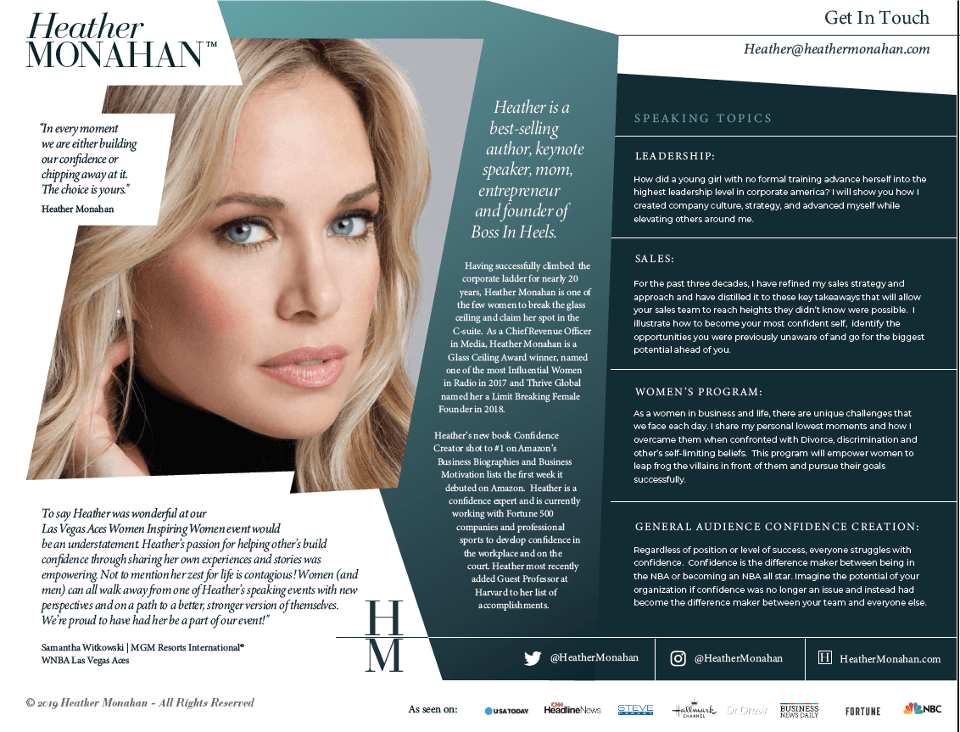Press Clips
Having run a successful training and consulting business for more than 16 years (after a career in corporate America), I’ve spoken frequently to audiences large and small around the globe. However, for the first decade or so of my business, I viewed speaking engagements as a marketing tool, not a revenue opportunity. While I may not have been paid for the event, I would regularly accept invitations to speak due to the exotic location, opportunity to get in front of a target audience (who would hopefully contact me for follow on work) and most of all – I just loved speaking! But after a few time consuming speaking events in Milan, Marseilles and Costa Rica, I had a bit of an epiphany – Why am I speaking for free when I could be making money doing it? I know it sounds crazy, but prior to that moment, I never really thought of speaking as a potential revenue stream itself. Even though I would consistently have packed audiences at my events and long lines of eager participants waiting to chat afterwards, I’d never really thought about monetizing speaking – then I shifted my entire business model to focus primarily on paid speaking events.
While the actual product may not change much whether a speaker is paid or not, transitioning from a pro bono workshop presenter to a paid keynote speaker can be a big shift from a business model perspective. While the most highly demanded nationally recognized speakers are often signed to a speakers bureau who feeds them paid opportunities on a regular basis, it can be quite daunting and confusing for the more typical speaker who might be absolutely amazing but just can’t figure out how to get paid to speak! As someone who successfully navigated that transition several years ago, here are my top recommendations.
Stand firm with your pricing
I know this sounds overly simplistic, but it was the first strategy I employed that worked immediately when I made the transition several years ago. Let me explain…Once I decided to transition from unpaid to paid speaking, I actively sought out professional speakers who were consistently securing paid events. I reached out to one guy in particular who had a speaking calendar posted online filled with speaking events for a professional organization that I’d spoken to for more than a decade (for free!). When I asked him how he’d managed to get them to pay him for the same types of events that I’d done for free, he simply said, “They’re always going to say they don’t have budget. You just have to insist on it!” I was floored. It couldn’t be that simple I thought, but in many ways it was. Over the next couple years, when negotiating with various clients (including professional organizations), about half agreed to pay after initially stating they had no budget. Typically, professional organizations would only pay about $3,000-$5,000 per event, but they were paying nonetheless. Of course, these fees are nowhere near where you’d want to charge after you’re more seasoned and in-demand, but $5,000 beats $0 any day when you’re starting out.
Overall, I learned that some professional organization or industry events simply don’t have speaker budgets or they just don’t pay speakers as policy, but others may be willing to pay only those speakers who stand firm on their pricing. I learned to proactively discern which events would most likely have some speaker budget flexibility. For example, events where there will be a large number of paying attendees (e.g. annual conference in a major city at a nice hotel) typically will have budget to support paying a speaker (particularly the keynote). Even if you’re not able to secure payment to speak, you might propose that they consider getting a sponsor to bulk purchase your book (if you’ve authored one) and cover your expenses. Typically, corporate events have much more flexible budgets and this isn’t an issue as much, but if you’re just starting to speak professionally, industry and professional organization events will provide many of your initial speaking opportunities and they’re typically much more cost constrained. While I’m not a believer in being pushy (or obnoxious) in any way, it was certainly helpful early on to realize that many organizations will negotiate pricing, but you may have to stand firm on pricing to start the negotiation.
Develop original content consistently
The #1 piece of advice that I give to new speakers just starting to build a business is to become a thought leader in your industry or domain area. One of the best ways to do that is to generate content frequently and consistently. Determine where you shine best – shooting video, writing articles or white papers, recording podcasts, etc., then develop a schedule for generating content. Once you’ve got great content, it can be repurposed in so many ways (e.g. social media posts, newsletters, blogs, submitted to well known publications, etc.). Taking the time to develop a deep arsenal of fresh content that shows off your expertise and provides true value to the viewer is well worth the effort.
Speaker and bestselling author of 48 books, Dianna Booher suggests writing an excellent book with a major publisher then marketing it aggressively as an effective strategy for securing paid opportunities. Booher shares, “In the beginning fully 78% of my business came to me from those having read my books or media coverage of my books. After three decades, almost all my leads come from those who’ve read my books.”
Develop high quality marketing materials
You probably wouldn’t buy a computer from a website that was slow, glitchy and looked amateurish, would you? Similarly, event organizers and other clients won’t typically consider paying top dollar with a speaker who doesn’t seem ultra professional. For speakers, having professionally produced video and similarly impressive marketing collateral is a must. Speaker and author Ken Schmidt explains, “If you don’t have a professionally produced and edited video of you speaking in front of an audience, forget about ever getting hired to speak. Video must show you making the most important parts of your presentation and – just as important – show how the audience is reacting.” Keynote speaker Heather Monahan concurs, “Creating a speaking reel, deck and sharing recommendations and reviews of your past speaking engagements is expected.” Investing in graphic design, website and other experts to assist with development of marketing collateral can be well worth the cost.

Speak for free — strategically
While it might sound completely paradoxical to suggest speaking for free as a strategy for getting paid speaking events, it would be irresponsible not to acknowledge the bounty of opportunities that unpaid events can offer. Dorie Clark’s Harvard Business Review article “How to Land Your First Paid Speaking Gig” insists that speaking for free is a healthy process where speakers can in fact become worthy of being paid. Indeed, speaking for free can absolutely become a valuable component of your overall marketing strategy and may be an absolute requirement if you’re just starting out. In fact, keynote speaker and best selling author Carlos Gil recommends speaking for free at 25-50 events minimum before pursuing paid engagements.
However, once you’re a seasoned speaker and ready to consistently charge for speaking, it’s important to be very selective and strategic in accepting unpaid events in a way that’s smart and doesn’t ultimately cannibalize paid opportunities. As I mentioned earlier, there are major industry events with celebrity keynotes that simply won’t pay individual workshop presenters. I’ve personally presented at conferences keynoted by Oprah, Bill Clinton, Malcom Gladwell, Colin Powell, and other celebrity names. I had no delusion about being paid to speak at those events, but I recognized the overall upside of participating. I knew I’d have the opportunity to speak to a large (300+) group (which would likely generate leads for paid engagements), network with industry leaders over several days and add an amazing credit to my bio, so for those strategic reasons speaking for free made sense to me.
Ultimately, the goal with unpaid events is to cherry pick the ones where the benefits clearly outweigh the cost (of your time and energy). To do so strategically, acknowledge non monetary benefits that can provide significant value to your business. If they’ll be videotaping, can the organizer provide you a copy of your talk? This could be extremely valuable collateral for your website or marketing materials. Will they have a bookstore where your book could be sold? Can you collect email addresses (via comment card) to add to your newsletter database? Is this an opportunity to give back to an organization that’s meaningful for you personally? The key isn’t to never speak for free. Instead, the goal is to maximize fees for most events and select a few unpaid events that make sense given your business model, the anticipated non monetary benefits and your own personal interests.
Don’t actively try to sell yourself
Overall, one of the best ways to get paid to speak is to not try to sell yourself. Instead, develop yourself as a highly valuable service that others simply want to access. Booher recommends, “Focus on marketing your business rather than selling. In other words, generate inbound inquiries using excellent marketing strategies (website, social media interactions and free speeches at industry conferences in front of the RIGHT audience members who can hire you).” Similarly, keynote speaker Simon T. Bailey echoes that sentiment.
“The best way to get a paid engagement is to stop selling and start connecting your expertise to the client’s problems. The client hiring you doesn’t care about your speech. They want to know you have done the work. Be transformational with tangible results instead of just telling a story or poem with three points.”
It should go without saying that the first order of business in getting paid to speak is being worth it – becoming a high demand speaker with tons of value to provide to audiences. In my next article I’ll address this point by exploring common mistakes and tips for becoming a successful professional speaker.


